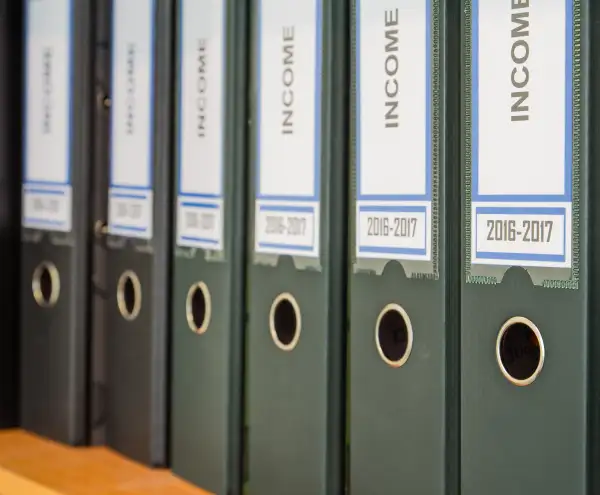Here's How Long You Should Keep Your Tax Returns, According to Experts

When you are finally done filing your taxes, it can feel freeing — a big responsibility off your shoulders (until next year, that is). But don't go building a bonfire out of your receipts just yet. Tax pros say you should keep your tax returns and other records because they can be important references down the road if you get audited, sell a home, or have another major financial event.
Whether you keep your financial records on a hard drive, in a file cabinet, or some combination of those, tax experts say it’s important to know how long to keep tax returns. After all, it’s better to hang on to them and never need them than the other way around. For those of you who have embraced the Marie Kondo anti-clutter mindset, we apologize; this is going to be painful. But Uncle Sam doesn't care about your quest for minimalism.
According to the I.R.S., the basic rule of thumb for ordinary filers is to keep tax returns for three years. If you file a claim for a credit or refund after you file your return, you should keep record for three years from that date, or two years from when you paid the tax, whichever is later.
Why should you keep your tax returns for three years? If the I.R.S. audits you, they generally do a three-year lookback, so you'll want to have those previous years' returns available. Keeping records for three years also benefits you, because you have three years after filing to claim any deductions or credits you might have missed initially.
There are some situations, though, for which the I.R.S. requires longer record-keeping. You should keep employment tax records for four years, the I.R.S. recommends. If you understated your income by more than 25% — which could happen if you make estimated payments and work in a field where your income fluctuates considerably from year to year — keep your returns going back six years, since the I.R.S. can use that underpayment to justify demanding a twice the normal period if they audit you.
"If you file a Schedule C as a freelancer or a self-employed individual, you should keep your tax paperwork for up to seven years," said Mark Jaeger, director of tax development at TaxAct. If you write off bad debt or a bad investment, it's wise to keep those records for seven years, as well.
Then there are a few things you should hang onto for the very long term. "For documents regarding assets like your home, those you would need to keep as long as you have your home," said Lisa Greene-Lewis, tax expert for TurboTax.
Fortunately, technology has made it much easier to hang on to all of this documentation, pointed out Gil Charney, director of The Tax Institute at H&R Block. "It’s actually becoming easier to retain the records if you have the discipline to scan them in and keep in the cloud or on a hard drive, you’re not cluttering a filing cabinet anymore," he said.
So, Marie Kondo fans, this should make accumulating all that paperwork year after year a little easier to bear.
We’ve included affiliate links into this article. Click here to learn what those are.
